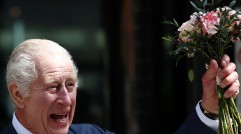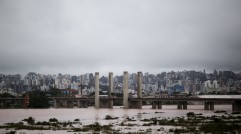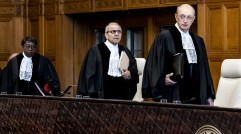Nobel Peace Prize Awarded to Tunisian National Dialogue For Maintaining Peace, Democracy in Country
The Nobel Peace Prize was been awarded to Tunisian National Dialogue Quartet on Friday for the coalition's efforts in bringing democracy and maintaining peace in the country.
The Norwegian Nobel Committee announced their decision in choosing the Quartet, which formed in 2013 in the wake of Tunisia's Jasmine Revolution two years earlier. The Quarter acted "when the democratization process was in danger of collapsing as a result of political assassinations and widespread social unrest."
The coalition is formed of four organizations -- the Tunisian General Labour Union (UGTT), the Tunisian Confederation of Industry, Trade and Handicrafts (UTICA), the Tunisian Human Rights League (LTDH), and the Tunisian Order of Lawyers. The committee emphasized the Nobel Prize was awarded to quartet as a whole, rather than any of the four organizations individually.
Tunisia influenced set off a huge regional political movement in 2011, known as the Arab Spring, after a street vendor set himself on fire and sparked countrywide protests. Tunisian dictator Zine el-Abidine Ben Ali was quickly forced into exile, and the The Islamist Ennahda Party was voted in the power.
Protests began again when the Ennahda Party proposed laws based on Islamist principles that threatened to remove the full equality of men and women and destroy a secular tradition dating back decades. The National Dialogue Quartet stepped forward to prevent a descent into civil war, fostering negotiations that eventually led to the Ennahda Party stepping down.
"The Arab Spring originated in Tunisia in 2010 and 2011, but it quickly spread to other countries in North African and the Middle East," Nobel Committee chairwoman Kaci Kullmann Five said.
"In many of these countries, the struggle for democracy and human rights has come to a standstill or suffered setbacks. Tunisia, however, has seen a democratic transition based on a vibrant civil society, with demands for respect for basic human rights."
"This is a great joy and pride for Tunisia, but also a hope for the Arab World," UGTT chief Hussein Abassi told Reuters. "It's a message that dialogue can lead us on the right path. This prize is a message for our region to put down arms and sit and talk at the negotiation table."
Subscribe to Latin Post!
Sign up for our free newsletter for the Latest coverage!
* This is a contributed article and this content does not necessarily represent the views of latinpost.com














